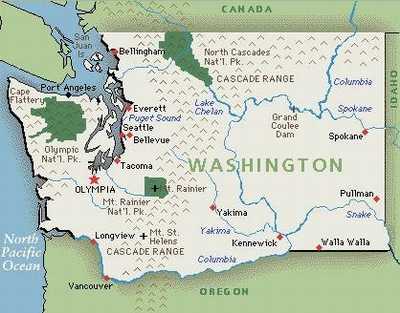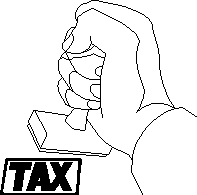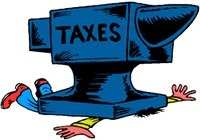Another Government Attempts To Cure Self-Induced Ills With
Excessive Taxation
News and Analysis by ANN Editor-In-Chief, Jim Campbell
We've been looking over this for the last few days and trying to
get info back from the State of Washington (which has not yet
returned our calls) but it appears that the home state of Boeing
Aircraft is about to proclaim itself an anti-aviation state in the
worst possible way.

 The inability of a number of
government agencies to control their spending is well documented
around the nation, but the attempt to fix it with new and
aggressive taxation is now targeting aviation. A recent proposal in
the state of Washington would create some expensive new taxes
equating to a half per cent annual excise tax arrogantly explained
away as needed for the “...privilege of using any aircraft in
the state.” Of course, the value of that "privilege" may not
be worth the potential tax penalties -- according to Washington
State pilots contacting ANN... two of which have literally
threatened to move to more aviation friendly locales if the tax is
enacted. Mind you, this is proposed in a state that has lost three
airports in just the last five years, to boot -- and a state that
has already driven a significant share of Boeing expenditures
outside its borders.
The inability of a number of
government agencies to control their spending is well documented
around the nation, but the attempt to fix it with new and
aggressive taxation is now targeting aviation. A recent proposal in
the state of Washington would create some expensive new taxes
equating to a half per cent annual excise tax arrogantly explained
away as needed for the “...privilege of using any aircraft in
the state.” Of course, the value of that "privilege" may not
be worth the potential tax penalties -- according to Washington
State pilots contacting ANN... two of which have literally
threatened to move to more aviation friendly locales if the tax is
enacted. Mind you, this is proposed in a state that has lost three
airports in just the last five years, to boot -- and a state that
has already driven a significant share of Boeing expenditures
outside its borders.
Not the sharpest pencils in the box, these Washington state
legislators...
House Bill 3176 is summarized in state documents as requiring
that, "All aircraft must be registered for each calendar year in
which it is operated within the state. An excise tax, collected by
the Aviation Division of the state Department of transportation, is
imposed when an aircraft is first registered and the tax is
subsequently paid annually during January of each year. The tax is
a fixed charge that varies based on the type of aircraft. Annual
charges range from $20 to $125. The tax is levied in lieu of the
personal property tax. However, the law exempts several types of
aircraft from the excise tax, which in turn subjects an aircraft to
the personal property tax. Commercial aircraft principally used in
interstate or foreign commerce are an example of aircraft exempt
from the aircraft excise tax but subject to the personal property
tax. Ninety percent of the receipts from the tax are deposited in
the general fund with the remainder going to the aeronautics
account."
The import is clear... taxing parties seen by some as "Fat Cats"
or utilizing properties, equipment, and transportations systems
categorized as extravagant pays well with uneducated voters..
especially for those voters who either have not studied the import
of the matter, can not afford the same, or are otherwise dismissive
of their true value and importance. Like the attack on BizAv by
ignorant member so Congress last year, Washington state legislators
seem willing too paint a Bull's Eye on the backs of aircraft owners
and operators -- despite the extensive fiscal damage that is sure
to result as aircraft sales, operations and ownership decline as a
result of the exorbitant tax scenario. Worse, as noted above, these
taxes would be primarily dedicated to the general fund... and not
to aviation interests (in opposition to the excise taxes this
legislation would replace...) again asking Peter to Paul for Paul's
inability to spend within his means.
 The real cost? A New Corvallis or
Cirrus is likely to get hit for as much as $3000... each year (with
some annual reevaluation/depreciation in accordance with the
aircraft's loss of value). A new Piper Matrix, will get nailed for
over $4000. God Help The Guy who saves his sheckles and buys
himself a light jet or turboprop...
The real cost? A New Corvallis or
Cirrus is likely to get hit for as much as $3000... each year (with
some annual reevaluation/depreciation in accordance with the
aircraft's loss of value). A new Piper Matrix, will get nailed for
over $4000. God Help The Guy who saves his sheckles and buys
himself a light jet or turboprop...
You get the idea... the annual costs are staggering and will
likely have an immediate and debilitating effect on the health of
Washington aviation... and later on, the Washington state economy
as less aircraft mean the need for less service, support and
aviation businesses... killing off jobs that were already tough to
come by, to begin with... and at best, send them off to other
states that understand the verifiable value of a strong, active
aviation community within their borders.
The House Bill Analysis notes that, "The existing aircraft
excise tax, which imposes an annual fixed charge, is replaced with
a tax assessed on the taxable value of the aircraft. The taxable
value is the fair market value of the aircraft, which is the most
recent purchase price of the aircraft depreciated based on a
schedule prepared at least once a year by the Department of
Revenue. The tax rate is 0.5 percent. The tax applies to the same
aircraft subject to the current aircraft excise tax and is imposed
annually. All of the revenue from the tax is deposited into the
state general fund."
ANN will continue to seek additional background and information
on this proposal and furnish updates as they are made
available.
 Aero-News: Quote of the Day (12.18.25)
Aero-News: Quote of the Day (12.18.25) Classic Aero-TV: Viking Twin Otter 400--Bringing the DHC-6 Back Into Production
Classic Aero-TV: Viking Twin Otter 400--Bringing the DHC-6 Back Into Production NTSB Final Report: Rans Employee Flying Club Rans S-6ES Coyote II
NTSB Final Report: Rans Employee Flying Club Rans S-6ES Coyote II ANN FAQ: Submit a News Story!
ANN FAQ: Submit a News Story! ANN's Daily Aero-Term (12.18.25): Braking Action Advisories
ANN's Daily Aero-Term (12.18.25): Braking Action Advisories





